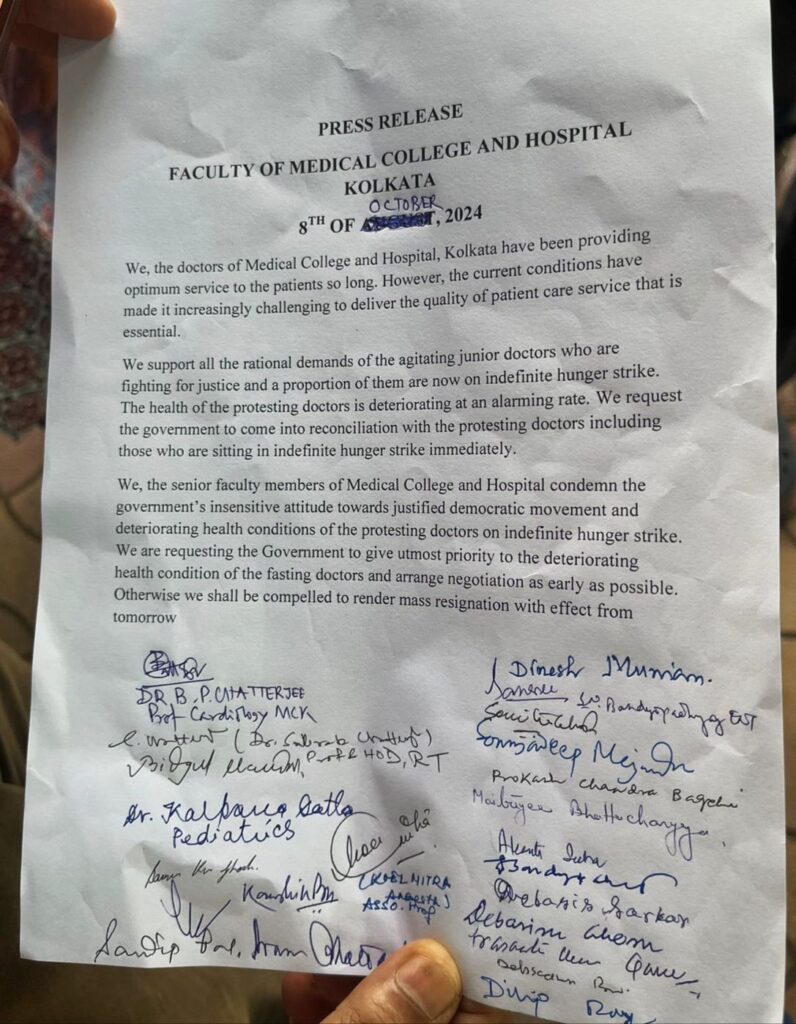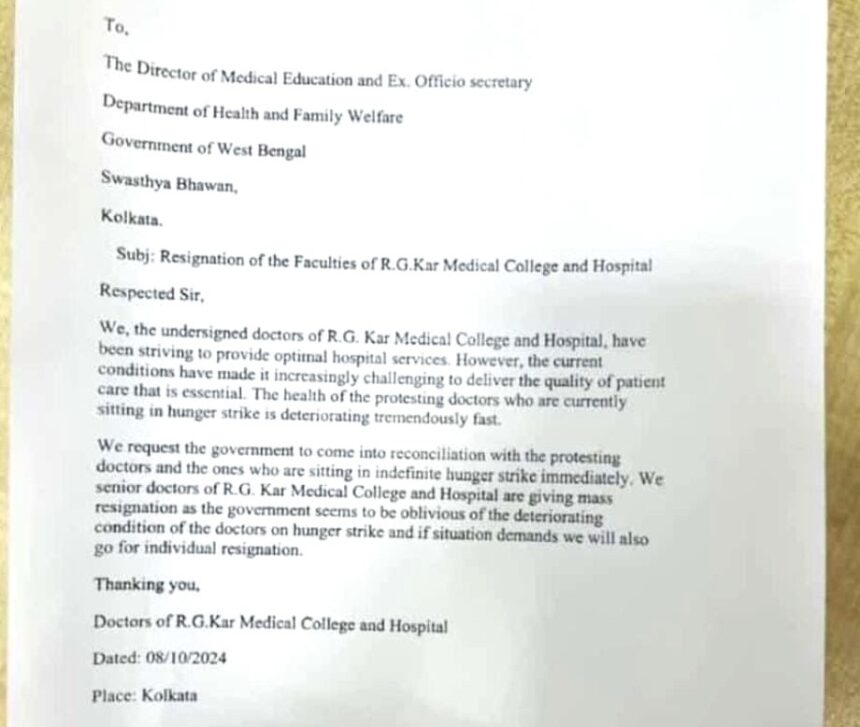In a striking demonstration of solidarity, approximately 50 senior doctors from RG Kar Medical College and Hospital in Kolkata have resigned en masse to support junior doctors engaged in a fast-unto-death protest. This protest, which began on October 5, 2024, calls for justice for a deceased female doctor who was allegedly raped and murdered in August, as well as urgent reforms in a healthcare system marred by corruption.
The Decision to Resign
The collective decision to resign was made during a meeting of the heads of departments at the state-run hospital on the morning of October 8. A senior doctor commented, “This is to express our solidarity towards those young doctors who are fighting for a cause.” The situation at RG Kar is critical enough that senior doctors from other institutions, such as NRS Medical College and Hospital, are contemplating similar actions in solidarity with their colleagues.
The senior doctors of RGKAR medical college and hospital has started mass resignation. 🫡#justiceforRGKar #RGKarProtest #Massresignation pic.twitter.com/A12v3tcXKL
— Dr. Anusmita Mukherjee (@anusmita2000) October 8, 2024A Unified Front
The Joint Platform of Doctors, West Bengal, has pledged its support for the junior doctors, emphasizing their demands for justice for the postgraduate trainee who lost her life. The manifesto also calls for the dismantling of the “corruption-ridden” healthcare system. Despite the ongoing hunger strike and escalating health concerns among the junior doctors, the platform criticized the lack of response from the government, stating, “We will stand in solidarity,” and highlighting the need for a patient-friendly healthcare environment.
The platform has also reached out to private sector doctors, urging them to take meaningful actions in support of their junior counterparts. This appeal comes amid a backdrop of escalating tensions and a deteriorating situation for the protesting doctors.


The Hunger Strike and Its Implications
While the junior doctors have maintained their fast-unto-death for four days, they have been vocal about their demands for improved safety in the workplace and other essential reforms. Seven junior doctors from various medical colleges, including one from RG Kar, initiated this indefinite hunger strike on Saturday, citing the government’s failure to address ten crucial demands related to hospital security and infrastructure.
In a show of solidarity, around 15 senior doctors joined the junior doctors in a symbolic hunger strike. They began their demonstration at Dorina Crossing in the Esplanade area of central Kolkata, where junior doctors have been protesting since the weekend. The situation is particularly poignant, as this protest coincides with the Durga Puja festivities, a major cultural event in the region.
The Government’s Response
West Bengal Chief Secretary Manoj Pant has called on the agitating doctors to return to their duties, expressing hopes that ongoing projects at state-run medical facilities will be completed soon. He reported progress in the installation of CCTV systems and other renovations but faced criticism from the protesting doctors for not meeting their demands effectively.
Despite government reassurances, junior doctors have continued to voice their dissatisfaction. Their ten demands include calls for justice for the victim, removal of the state health secretary, the establishment of a centralized referral system, and enhanced security measures within hospitals.
A Call for Continued Action
Dr. Debabrata Das, a senior doctor from the ENT department at RG Kar, articulated the urgency of the situation: “Junior doctors have been protesting over the past two months and have now started a hunger strike. Their health conditions have started deteriorating. They are like our children. We senior doctors couldn’t sit idle and have tendered a mass resignation.” This sentiment reflects the deep concern among senior medical professionals regarding the welfare of their junior colleagues and the need for systemic change within the healthcare sector.
Another senior doctor, Sumit Hazra, clarified that resigning was not a means of abandoning their duties. “We have tendered our resignations, but we won’t be leaving our jobs tomorrow. We’ll keep working until our resignations are approved. The goal is to convey to the state administration that negotiations with the junior doctors on strike are warranted. This impasse cannot go on,” he said.
The Broader Impact of the Protests
The horrific episode that triggered this wave of protests—the alleged rape and murder of a trainee doctor at RG Kar on August 9—has echoed throughout the nation, underscoring the dangers faced by medical workers, particularly women, in the workplace. The unrest led junior doctors to initially cease work for 41 days, a strike that was partially lifted following the removal of certain officials and assurances from the government to enhance security and infrastructure in government hospitals.
However, tensions resurfaced after attacks on junior doctors in government hospitals, leading to the current state of unrest. As the Durga Puja festival approaches, some senior doctors have urged the junior doctors to reconsider their all-out strike, recognizing the cultural significance of the occasion while emphasizing the importance of their cause.
The mass resignation of senior doctors at RG Kar Medical College and Hospital serves as a powerful reminder of the challenges faced by medical professionals in West Bengal. As junior doctors continue their hunger strike and fight for justice and reform, the solidarity displayed by their senior colleagues highlights a critical moment in the ongoing struggle for a safer and more equitable healthcare system. The unfolding situation remains tense, with both sides urging the government to address the pressing issues at hand.
Read More: India and Maldives Empowered Partnership: Charting a Bright Path Forward Together






